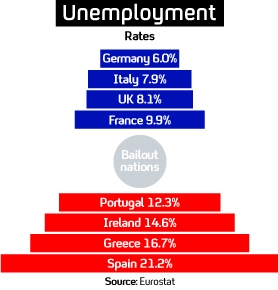Young people suffer as unemployment hits 17-year high
UK unemployment soars to its highest level for 17 years with 16 to 24-year-olds the hardest hit. Economics Editor Faisal Islam meets some of the young jobless fighting to get onto the career ladder.
More than 100,000 people have been added to the numbers now out of work, as new figures from the Office for National Statistics show the jobless rate has soared to 8.1 per cent, the highest level since 1996.
Young people are especially badly hit after a huge jump in the number of 16-24 year-olds out of work. Together with those classed as economically inactive, it means that half of that age group are now not employed.
Read Faisal Islam's blog: Young workers are never more challenged than now
Employment slump
The grim data reveals that the situation’s got worse in almost every category: there has been the biggest-ever cut in part-time workers, as well as a fall of 178,000 in employment in the second quarter of the year.
FactCheck: Who's got the better record on youth employment?
150,000 people were made redundant in the last three months – 6,000 more than the previous quarter. Long term unemployment has also gone up.

The UK’s not the worst in Eurpe: figures from Eurostat comparing all 27 members of the European Union show that Britain is almost exactly in the middle, just below Poland – but with a higher unemployment rate than Italy, which is struggling with its own deficit crisis. By far the worst jobless figures in the EU are in Spain, where 21.4 per cent of people are out of work: in Greece, another country in deep economic turmoil, the figure in August this year had risen to 16.8 per cent.
The squandering of human talent through unemployment is a crime that will haunt future generations. Paul Kenny, GMB
Employment Minister Chris Grayling said: “It is clear we are seeing the effect of the international economic crisis on the UK labour market.” He said the government had launched a new work programme to support people get back into work, with new work-based academies due to provide more help for jobseekers.

But union leaders said government policy was “hurting but not working”. GMB General Secretary Paul Kenny said public sector cuts had made the situation far worse. “The squandering of human talent through unemployment is a crime that will haunt future generations,” he said.
Youth fears
And there’s particular concern about the leel of youth unemployment. Martina Milburn, from the Prince’s Trust. said the number of young people without work was now “almost twice the population of Manchester.”
She said calls to the Trust’s helpline had more than doubled over the last six months and called on Government and employers to work together to turn things around.
Labour’s summoned the Chancellor to the Commons for a full-day debate on jobs and the economy – insisting the figures were clear proof that Government policies weren’t working, and the country now needs a new direction.
Cameron admits figures ‘very disappointing’
At Prime Ministers questions this afternoon David Cameron admitted the figures were “very disappointing” – and that the Government should “do more to get our economy moving”. But Labour’s leader Ed Miliband wasn’t impressed with his refusal to abandon the coalition’s deficit reduction plans – accusing Mr Cameron of repeating “the same script, month after month”, and calling for a “credible” plan for growth.